 Petzlover
PetzloverBengal is originated from United States but Stone Cougar is originated from Egypt. Bengal may weigh 6 kg / 13 pounds lesser than Stone Cougar. Both Bengal and Stone Cougar has same life span. Both Bengal and Stone Cougar has same litter size. Bengal requires Moderate Maintenance. But Stone Cougar requires Low Maintenance
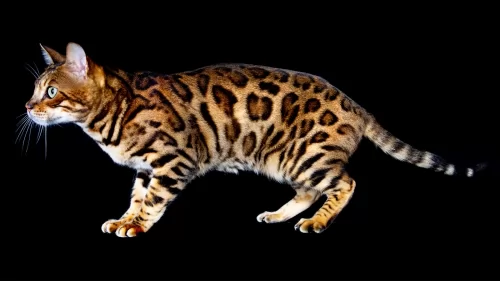 What an exquisite coat the Bengal cat has. It looks like the coat of a wild cat and can have spots, marbling, and rosettes, but it is domesticated, developed from hybrids – the spotted Egyptian Mau and the Asian Leopard cat.
What an exquisite coat the Bengal cat has. It looks like the coat of a wild cat and can have spots, marbling, and rosettes, but it is domesticated, developed from hybrids – the spotted Egyptian Mau and the Asian Leopard cat.
It is the only domestic breed of cat that has rosette markings. It is Jean Mill of California that you associate the Bengal cat with, and she conducted a number of graduate classes in genetics.
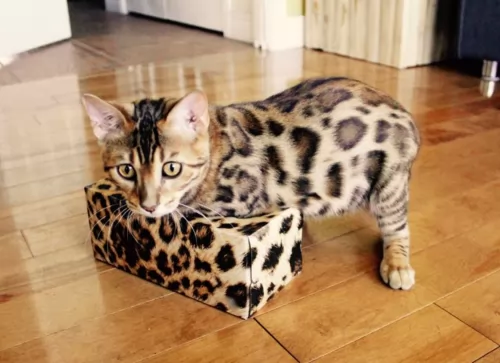 The Bengal looks like a wild cat and it can weigh up to 7kg. It can reach a height of 70cm with long, muscular legs and almond-shaped eyes which are green or blue.
The Bengal looks like a wild cat and it can weigh up to 7kg. It can reach a height of 70cm with long, muscular legs and almond-shaped eyes which are green or blue.
When it comes to the coat of the Bengal cat, it has a wide variety of colors and patterns. The cat can be brown, black, red, grey, spotted, clouded, ticked or rosette.
There are Bengal breeders that claim that their Bengals are hypoallergenic so that they won’t cause an allergic reaction with their owers. This is something that hasn’t been scientifically proved and in fact many will say that there isn’t such as thing as a hypoallergenic cat.
The Bengal is a medium to large-sized cat, being long and lean and muscular. As a low shedder, it is believed the Bengal is a hypoallergenic cat breed – a cat less likely to cause an allergy with its human owners.
When you bring a Bengal cat into your home, you’ll find they are energetic, smart, and playful and they love cavorting around in water.
People who have owned a Bengal say that the cat is friendly and that it enjoys interacting with humans. They’re cats capable of forming strong bonds with their human family, becoming affectionate and loyal. They in turn want to receive lots of loving attention.
They’re intelligent too and are quick to learn. You have to remember that these are part wild cat and that they are only classed as tame from the 4th generation (T4).
The cat has wild traits so it is only natural that it likes to hunt so don’t be alarmed when your Bengal presents you with dead mice, moles, and birds.
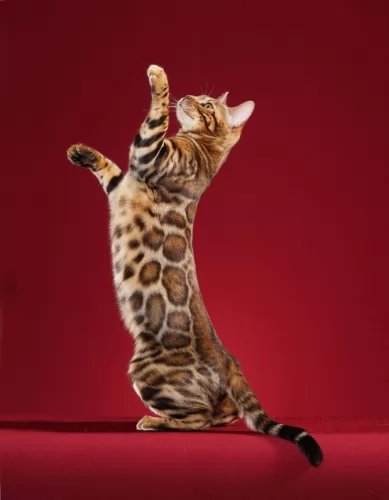 Bengal cats are intelligent and just like a dog he is clever at learning tricks and can even be taught things such as ‘sit’, ‘fetch’ or ‘lie down’. They actually make great companions as they are sensitive to their owner's moods and can even recognize human gestures and adapt their behavior to their owner's mood.
Bengal cats are intelligent and just like a dog he is clever at learning tricks and can even be taught things such as ‘sit’, ‘fetch’ or ‘lie down’. They actually make great companions as they are sensitive to their owner's moods and can even recognize human gestures and adapt their behavior to their owner's mood.
They’re vocal cats too and they like to communicate about their needs, being able to meow in different tones. They’re active cats and they want active owners – those who can spend time with them playing and even going on walks and hikes.
The Bengal certainly is a wonderfully companionable cat.
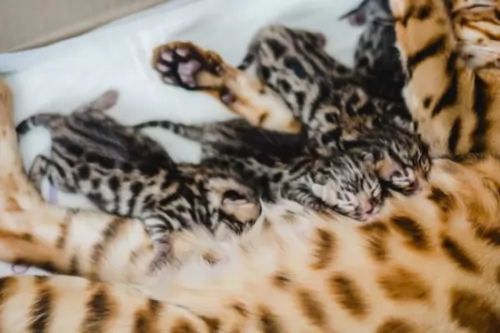 Hypertrophic cardiomyopathy (HCM) is a concern with the Bengal cat breed and this is a disease where the heart muscle becomes thick and unable to pump blood properly.
Hypertrophic cardiomyopathy (HCM) is a concern with the Bengal cat breed and this is a disease where the heart muscle becomes thick and unable to pump blood properly.
It’s a common genetic disease in Bengal cats. Cats used for breeding need to be screened each year to ensure no hypertrophic cardiomyopathy is present.
Another problem with the Bengal cat is Progressive retinal atrophy or PRA. Anyone wanting to breed Bengals should have their cat tested for this eye disease as the disease can lead to blindness.
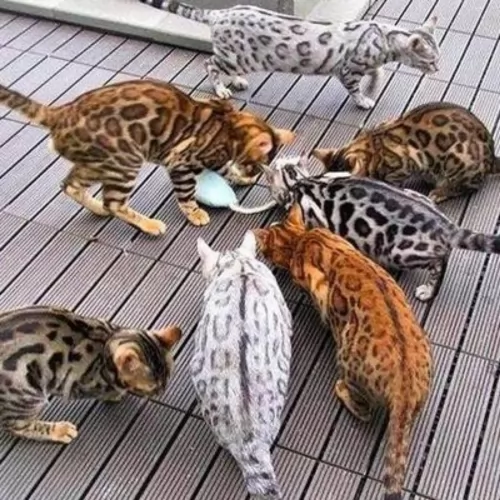 You will need a secured outdoor area for your Bengal cat where he can play and climb. He will need these for his activity levels as well as stimulating toys.
You will need a secured outdoor area for your Bengal cat where he can play and climb. He will need these for his activity levels as well as stimulating toys.
Provide feeding and water bowls and also make sure that you provide your Bengal with a shallow swimming pool as this cat loves water.
The Bengal is a healthy cat breed so it is important to provide your pet cat with the best food there is and to ensure he gets checked out at the vet every year.
Most hybrid breed owners provide raw food as these cats are often sensitive to commercially manufactured food. Having said that, there are high-quality prepared cat foods that will provide your Bengal with everything needed for a healthy life.
Look at providing your pet with a good supplement to ensure your furry friend has every chance to be healthy and happy.